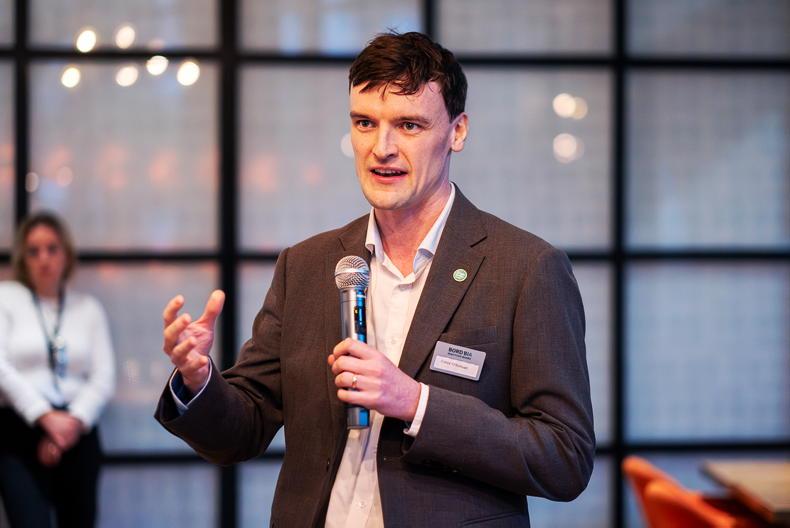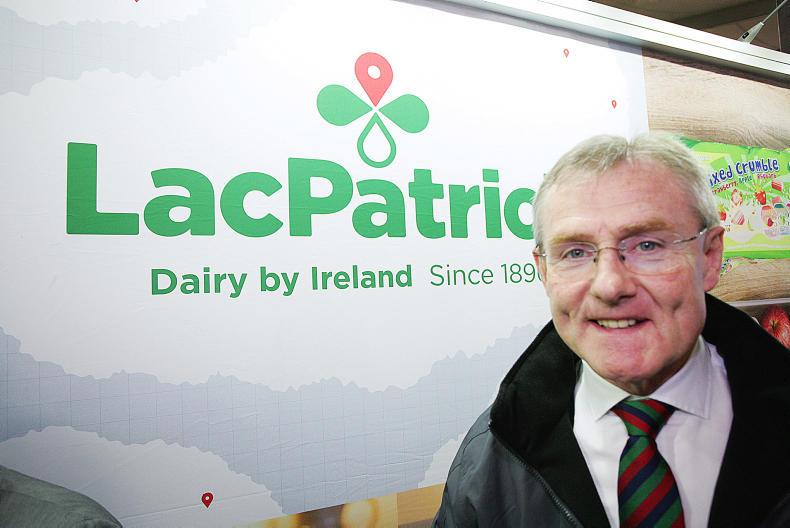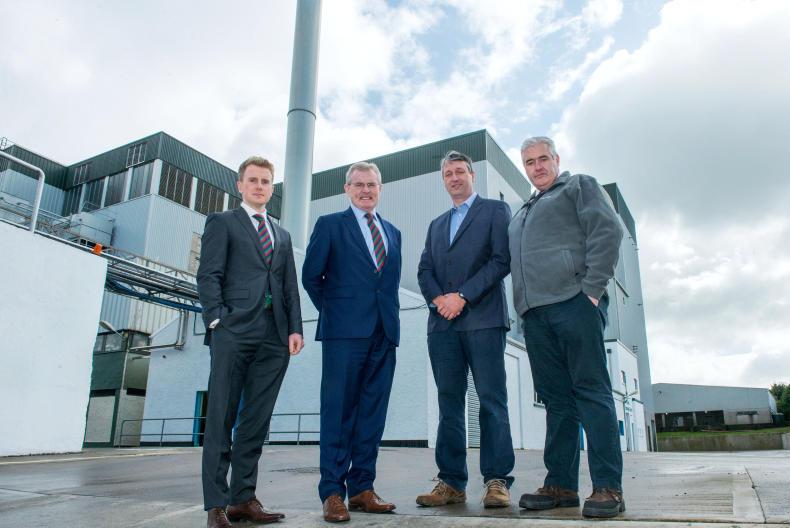When the board of LacPatrick signed off on a £30m (€40m) investment in a new 7.5t/hr drier at its site in Artigarvan, Co Tyrone, Brexit probably wasn’t to the forefront of anyone’s minds.
But as production from the new drier starts in the next few weeks, it coincides with a time of great political upheaval.
The new drier is the largest single investment in the dairy industry in Northern Ireland (NI) in the last 30 years. So, given the uncertainty caused by Brexit, could it be a massive risk? Or could it turn out to be an investment that ultimately leaves LacPatrick Co-op in a strong position?
“There are a lot of unknowns with Brexit. It is a series of threats and opportunities. The most immediate risk for any company is to ensure you have a milk pool and processing capacity in the same jurisdiction. This plant eliminates that risk for us,” explained LacPatrick chief executive Gabriel D’Arcy.
Listen to an interview with Gabriel D'Arcy in our podcast below:
Listen to "LacPatrick chief predicts softening of milk price" on Spreaker.
No doubt, LacPatrick needed to invest in processing capacity. At peak, its suppliers produce 60m litres per month, but its existing capability is 45m litres per month (including skim milk sold to the Abbotts infant formula plant in Cootehill). Once the new drier is fully operational, it will be capable of handling 90m litres per month.
With around 500m litres of its milk sourced in NI, and 110m litres in the Republic of Ireland, it made sense for LacPatrick to invest on the northern side of the Irish border.
In theory, it also solves a conundrum for the milk processing sector in NI – about 25% of the NI milk pool (around 600m litres) goes south for processing annually. If that is curtailed post-Brexit, the new LacPatrick drier means there is now sufficient capacity in NI to handle all that milk.
Except that a significant proportion of the milk pool heading south is in the hands of others such as Aurivo, Green Pastures and principally Lakeland.
“We have had discussions with other companies and neighbours looking for capacity. The fact is there isn’t enough milk processing capacity on the island of Ireland,” said D’Arcy.
The other major Brexit-related challenge is future market access, with LacPatrick a significant exporter of milk powder (produced in Artigarvan) into west Africa under its LP brand. That trade operates under an existing arrangement between the EU and west African states, which will no longer apply once the UK leaves the EU.
“Every exporting company in Britain in every sector has the same issue. All the noise from Britain is – don’t worry, we will get them up and going,” said D’Arcy.
But on the flip side, he claims that LacPatrick has been contacted by ROI-based companies who sell infant formula into the UK market, and are keen to source UK raw material (from NI).
Potentially these companies could make use of Inward Processing Relief post-Brexit. That scheme allows a company to avoid any import duties where goods are brought into the EU (in this case ROI) for processing from outside the EU (in this case the UK), so long as the end product is sold back outside the EU (into the UK).
“We are also already getting enquiries from companies in Britain reviewing their supply base, who want to ensure at least some of their raw material is now from the UK. Since the Brexit vote, our business into Britain is up 22 to 23%,” said D’Arcy.
New drier at Artigarvan
The first product has now been through the new 7.5t/hr drier at Artigarvan, and it should be fully operational in the coming weeks. The drier itself is served by two evaporators which can be closed down separately for cleaning, meaning that the drier is able to run 24/7.
The aim is to produce high-quality milk powder products, including a new instant milk powder product targeted at the African market.
LacPatrick suppliers will get a chance to see around the new facility, to be known as the LacPatrick Dairy Technology Centre, in September.
Read more
Billion-litre milk surge
Majority of co-ops hold March price
Dairy market recovery ‘still delicate’ as EU peak production approaches
New Zealand milk price of 31.5c/l forecast
When the board of LacPatrick signed off on a £30m (€40m) investment in a new 7.5t/hr drier at its site in Artigarvan, Co Tyrone, Brexit probably wasn’t to the forefront of anyone’s minds.
But as production from the new drier starts in the next few weeks, it coincides with a time of great political upheaval.
The new drier is the largest single investment in the dairy industry in Northern Ireland (NI) in the last 30 years. So, given the uncertainty caused by Brexit, could it be a massive risk? Or could it turn out to be an investment that ultimately leaves LacPatrick Co-op in a strong position?
“There are a lot of unknowns with Brexit. It is a series of threats and opportunities. The most immediate risk for any company is to ensure you have a milk pool and processing capacity in the same jurisdiction. This plant eliminates that risk for us,” explained LacPatrick chief executive Gabriel D’Arcy.
Listen to an interview with Gabriel D'Arcy in our podcast below:
Listen to "LacPatrick chief predicts softening of milk price" on Spreaker.
No doubt, LacPatrick needed to invest in processing capacity. At peak, its suppliers produce 60m litres per month, but its existing capability is 45m litres per month (including skim milk sold to the Abbotts infant formula plant in Cootehill). Once the new drier is fully operational, it will be capable of handling 90m litres per month.
With around 500m litres of its milk sourced in NI, and 110m litres in the Republic of Ireland, it made sense for LacPatrick to invest on the northern side of the Irish border.
In theory, it also solves a conundrum for the milk processing sector in NI – about 25% of the NI milk pool (around 600m litres) goes south for processing annually. If that is curtailed post-Brexit, the new LacPatrick drier means there is now sufficient capacity in NI to handle all that milk.
Except that a significant proportion of the milk pool heading south is in the hands of others such as Aurivo, Green Pastures and principally Lakeland.
“We have had discussions with other companies and neighbours looking for capacity. The fact is there isn’t enough milk processing capacity on the island of Ireland,” said D’Arcy.
The other major Brexit-related challenge is future market access, with LacPatrick a significant exporter of milk powder (produced in Artigarvan) into west Africa under its LP brand. That trade operates under an existing arrangement between the EU and west African states, which will no longer apply once the UK leaves the EU.
“Every exporting company in Britain in every sector has the same issue. All the noise from Britain is – don’t worry, we will get them up and going,” said D’Arcy.
But on the flip side, he claims that LacPatrick has been contacted by ROI-based companies who sell infant formula into the UK market, and are keen to source UK raw material (from NI).
Potentially these companies could make use of Inward Processing Relief post-Brexit. That scheme allows a company to avoid any import duties where goods are brought into the EU (in this case ROI) for processing from outside the EU (in this case the UK), so long as the end product is sold back outside the EU (into the UK).
“We are also already getting enquiries from companies in Britain reviewing their supply base, who want to ensure at least some of their raw material is now from the UK. Since the Brexit vote, our business into Britain is up 22 to 23%,” said D’Arcy.
New drier at Artigarvan
The first product has now been through the new 7.5t/hr drier at Artigarvan, and it should be fully operational in the coming weeks. The drier itself is served by two evaporators which can be closed down separately for cleaning, meaning that the drier is able to run 24/7.
The aim is to produce high-quality milk powder products, including a new instant milk powder product targeted at the African market.
LacPatrick suppliers will get a chance to see around the new facility, to be known as the LacPatrick Dairy Technology Centre, in September.
Read more
Billion-litre milk surge
Majority of co-ops hold March price
Dairy market recovery ‘still delicate’ as EU peak production approaches
New Zealand milk price of 31.5c/l forecast









SHARING OPTIONS